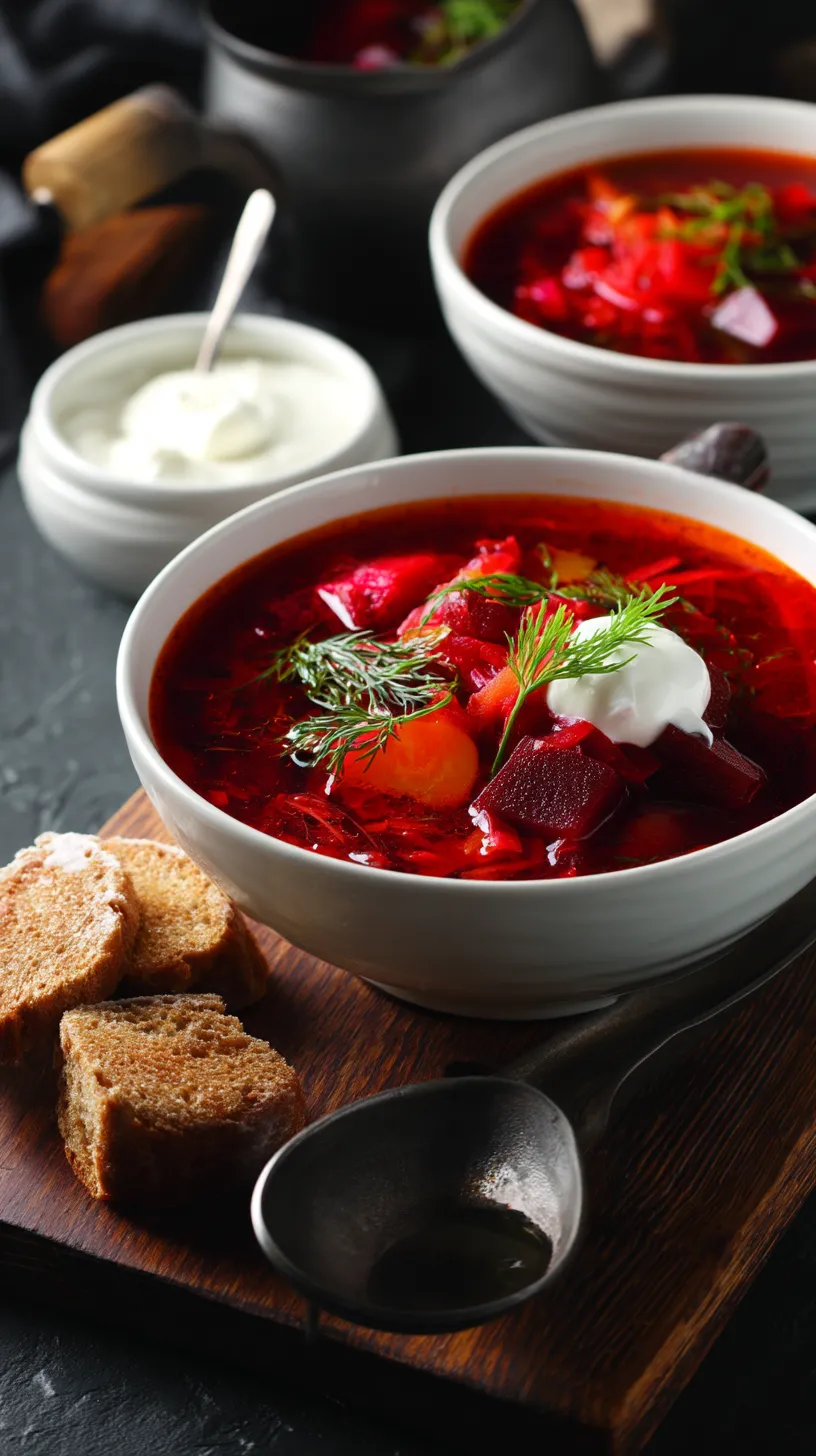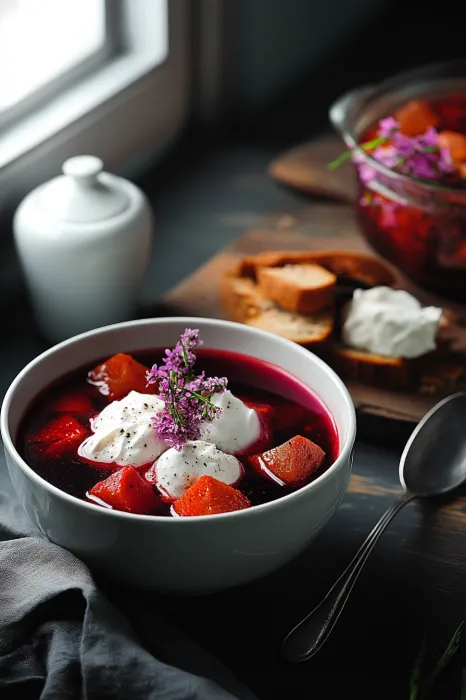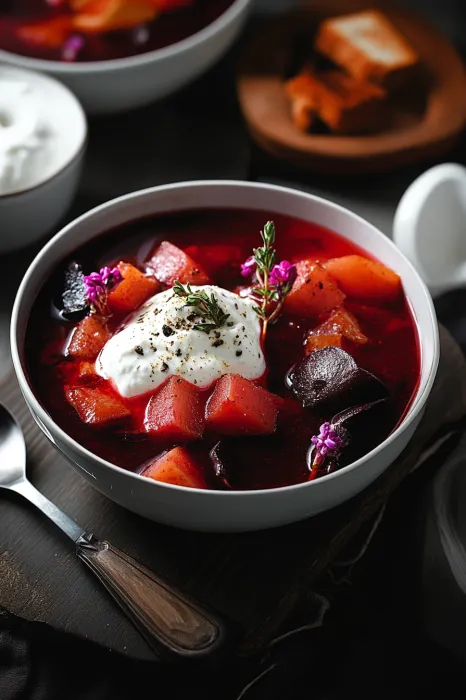 Save
Save
This vibrant ruby-red borscht has been my staple comfort food recipe since discovering Eastern European cuisine in culinary school. The combination of earthy beets, tangy sour cream, and fragrant dill creates a symphony of flavors that warms both body and soul, especially during colder months.
I first made this recipe during a brutal winter storm when I was craving something nourishing but only had root vegetables on hand. What started as a pantry cleanout became my family's most requested soup, with my children now recognizing the telltale pink stains on my cutting board as a sign of good things to come.
Ingredients
- Beets choose firm medium sized beets with smooth skin and deep color for the richest flavor and vibrant color
- Potatoes I recommend waxy varieties like Yukon Gold that hold their shape during simmering
- Cabbage half a medium head adds wonderful texture and subtle sweetness as it softens
- Carrots add natural sweetness that balances the earthy beets perfectly
- Onion and garlic create the aromatic foundation that every great soup requires
- Vegetable or beef broth beef adds richness while vegetable keeps it lighter and vegetarian friendly
- Tomato paste concentrates umami flavors and enhances the deep red color
- Vinegar either white or apple cider brightens all the flavors and balances sweetness
- Sour cream the traditional cooling garnish that transforms each bowl with creamy tanginess
- Fresh dill the fragrant herb that is absolutely essential for authentic flavor
Step-by-Step Instructions
- Prep the Vegetables
- First peel and grate beets wearing gloves to prevent staining your hands. Dice potatoes into uniform half inch pieces to ensure even cooking. Grate carrots on the large holes of a box grater. Shred cabbage finely and chop onion into small pieces. Having everything prepared before starting makes the cooking process flow smoothly.
- Create Flavor Base
- Heat oil or butter in a heavy bottomed soup pot over medium heat until shimmering. Add onions and cook for 2 minutes until translucent before adding garlic and cooking for another minute until fragrant. This aromatic foundation builds the first layer of flavor without allowing the garlic to burn which would create bitterness.
- Develop Beet Flavor
- Add grated beets and tomato paste to the pot stirring constantly to coat everything evenly. Cook for 5 to 7 minutes allowing the beets to soften slightly and release their gorgeous color. The tomato paste will caramelize slightly adding depth to the final soup.
- Build the Soup
- Pour in broth all at once scraping the bottom of the pot to release any flavorful bits. Add potatoes carrots and cabbage followed by vinegar salt and pepper. The vinegar is crucial at this stage as it helps preserve the vibrant color of the beets and adds brightness to the rich flavors.
- Simmer to Perfection
- Bring everything to a gentle boil then reduce heat to maintain a steady simmer uncovered for 30 to 35 minutes. You want all vegetables to become tender but not mushy. Stir occasionally to ensure even cooking. The soup will reduce slightly concentrating the flavors.
- Final Seasoning
- Taste the soup carefully and adjust with additional salt pepper or a splash of vinegar if needed. The flavors should be balanced between earthy sweetness from the vegetables and bright acidity from the vinegar. This final seasoning step is crucial for a well rounded flavor profile.
 Save
Save
My grandmother always insisted on using the smallest beets available for her borscht claiming they contained the most concentrated flavor. While I was skeptical at first I've found her wisdom to be true. Whenever possible I seek out baby beets at farmers markets for this recipe and the difference in taste is remarkable.
Vegetable Preparation Tips
When handling beets consider not only wearing gloves but also using a dedicated cutting board as they stain almost everything they touch. For easiest preparation wrap beets individually in foil and roast until tender before peeling and grating. This intensifies their sweetness and makes the peeling process much simpler though it adds cooking time.
Make Ahead Strategies
Borscht actually improves with time making it perfect for advance preparation. Consider making a double batch and refrigerating for up to 4 days. The flavors deepen and meld beautifully overnight. When reheating bring to just below a simmer to preserve the vibrant color and nutrients. Add the sour cream and dill only upon serving never during storage.
Seasonal Variations
Summer borscht can be served chilled similar to gazpacho for a refreshing meal. Simply prepare as directed then refrigerate thoroughly before serving with extra dill and thinly sliced cucumbers floating on top. Winter borscht benefits from adding cubes of slow cooked beef or pork simmered separately and added during the final 15 minutes of cooking.
Cultural Context
Borscht varies tremendously across Eastern Europe with each country and even family claiming their version as the definitive recipe. Ukrainian borscht typically includes beans and sometimes pork or sausage while Polish versions might feature more root vegetables. This flexibility means you should feel free to adapt the recipe to your preferences and available ingredients while respecting the core elements of beets acidity and herbaceous finish.
 Save
Save
Recipe FAQs
- → What's the secret to the best borscht flavor?
The key lies in properly sautéing the beets with tomato paste before adding other ingredients, which develops their sweet, earthy flavor. Adding a touch of vinegar balances the sweetness, while the final garnish of sour cream and fresh dill is essential for the authentic taste contrast. For extra depth, add a bay leaf during simmering, and allow the soup to rest overnight—borscht famously tastes better the next day as flavors meld.
- → Can I make borscht ahead of time?
Absolutely! Borscht actually improves with time as the flavors deepen and meld. Make it up to 4 days ahead and store in the refrigerator in an airtight container. For longer storage, freeze portions without the sour cream garnish for up to 2 months. Just reheat gently and add fresh garnishes when serving.
- → How can I make a meat version of borscht?
For a heartier version, use beef broth instead of vegetable broth. You can also add about 1/2 pound of cooked shredded beef (chuck roast works well) or sliced cooked sausage to the soup during the last 15 minutes of simmering. Some traditional versions even use a beef bone during cooking for added richness and flavor.
- → Is there a way to prevent beet stains when preparing borscht?
Yes! Wear disposable gloves when handling raw beets to prevent staining your hands. For cutting boards and countertops, clean immediately after use with a mixture of lemon juice and salt, which helps break down the pigment. Use stainless steel utensils rather than plastic, which can absorb the color, and consider using an apron to protect clothing.
- → What are some traditional accompaniments to serve with borscht?
Dark rye bread is the most traditional accompaniment—ideally slathered with butter. Some serve pampushky (Ukrainian garlic bread rolls) alongside. Additional sour cream should always be offered at the table for guests to add to taste. In some traditions, a small plate of sliced hard-boiled eggs, green onions, and pickles accompanies the soup for added texture and flavor contrast.
- → Can I make a vegetarian/vegan version of borscht?
Definitely! Use vegetable broth as your base for a vegetarian version. For vegan borscht, also substitute the sour cream with a plant-based alternative made from cashews, coconut, or store-bought vegan sour cream. The butter used for sautéing can be replaced with olive oil or a plant-based butter. The core vegetables and flavors remain the same, delivering an equally delicious result.
